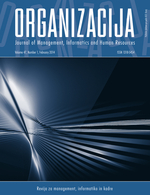The Employee as the Unknown Actor? A Discourse Analysis of the Employee Share Ownership Debate with Special Emphasis on Central and Eastern Europe
Abstract
Background and purpose: Although employee share ownership (ESO) deserves of a long tradition, we still know little about employees’ perspectives about ESO. The lack of knowledge about the employees’ attitudes towards ESO is discursively filled in the ESO debate. This paper challenges that deficit by carrying out a semantic analysis of the literature with the aim to identify the various actor constructions used implicitly in the ESO discourse.
Design/Methodology/Approach: We conduct a semantic analysis of the ESO discourse. To unfold the order of this discourse we draw on the distinction between surface and underlying structure of communication in the sense of Michel Foucault. We interpret some semantic lead differences, a term coined by Niklas Luhmann, to constitute the underlying structure of communication.
Results: We can identify six different streams on the ESO discourse’s surface level each defined by the ends pursued. The discourse’s underlying structure is made up of the distinctions production-consumption, capital-labour, and ownership-control that also determine the actor models implicitly in use.
Conclusion: We can identify five different actor models implicit in the ESO discourse. While the CEE discourse differs on the surface level in as far as it is more concerned with questions of political legitimation of the privatisation process than with questions of economic efficiency, thus introducing political distinctions in the discourse rather missing in the west, it shares the underlying semantic lead differences with the Western discourse as well as the actor models anchored in those differences.
Design/Methodology/Approach: We conduct a semantic analysis of the ESO discourse. To unfold the order of this discourse we draw on the distinction between surface and underlying structure of communication in the sense of Michel Foucault. We interpret some semantic lead differences, a term coined by Niklas Luhmann, to constitute the underlying structure of communication.
Results: We can identify six different streams on the ESO discourse’s surface level each defined by the ends pursued. The discourse’s underlying structure is made up of the distinctions production-consumption, capital-labour, and ownership-control that also determine the actor models implicitly in use.
Conclusion: We can identify five different actor models implicit in the ESO discourse. While the CEE discourse differs on the surface level in as far as it is more concerned with questions of political legitimation of the privatisation process than with questions of economic efficiency, thus introducing political distinctions in the discourse rather missing in the west, it shares the underlying semantic lead differences with the Western discourse as well as the actor models anchored in those differences.
Refbacks
- There are currently no refbacks.

